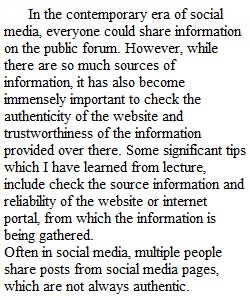


Q What were some of the most helpful fact-checking tips you learned during the lecture? Have you recently seen a social media post, or an article, making a claim that looked like it could contain misinformation? What did you do at the time? What might you do now, following Andrea’s talk and knowing more about fact-checking techniques? Think of a time when you have been misunderstood and reflect on what caused the misunderstanding. How were you able to correct it? Have you ever been labeled in a way that you thought was unfair? How did you go about addressing that issue? Try to think of a time when you have had a confrontation or discussion with someone you have disagreed with—were you able to overcome it, or not? Why and how? Think about an issue that you really care about: inequality, racial justice, whether college football should be played this fall, etc. Do some research to find out what others are saying about it—all sides of the issue—including ones that you may disagree with. Write an essay summarizing each of the positions you find, and then say what you think and why?
View Related Questions